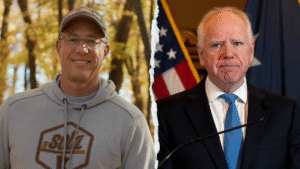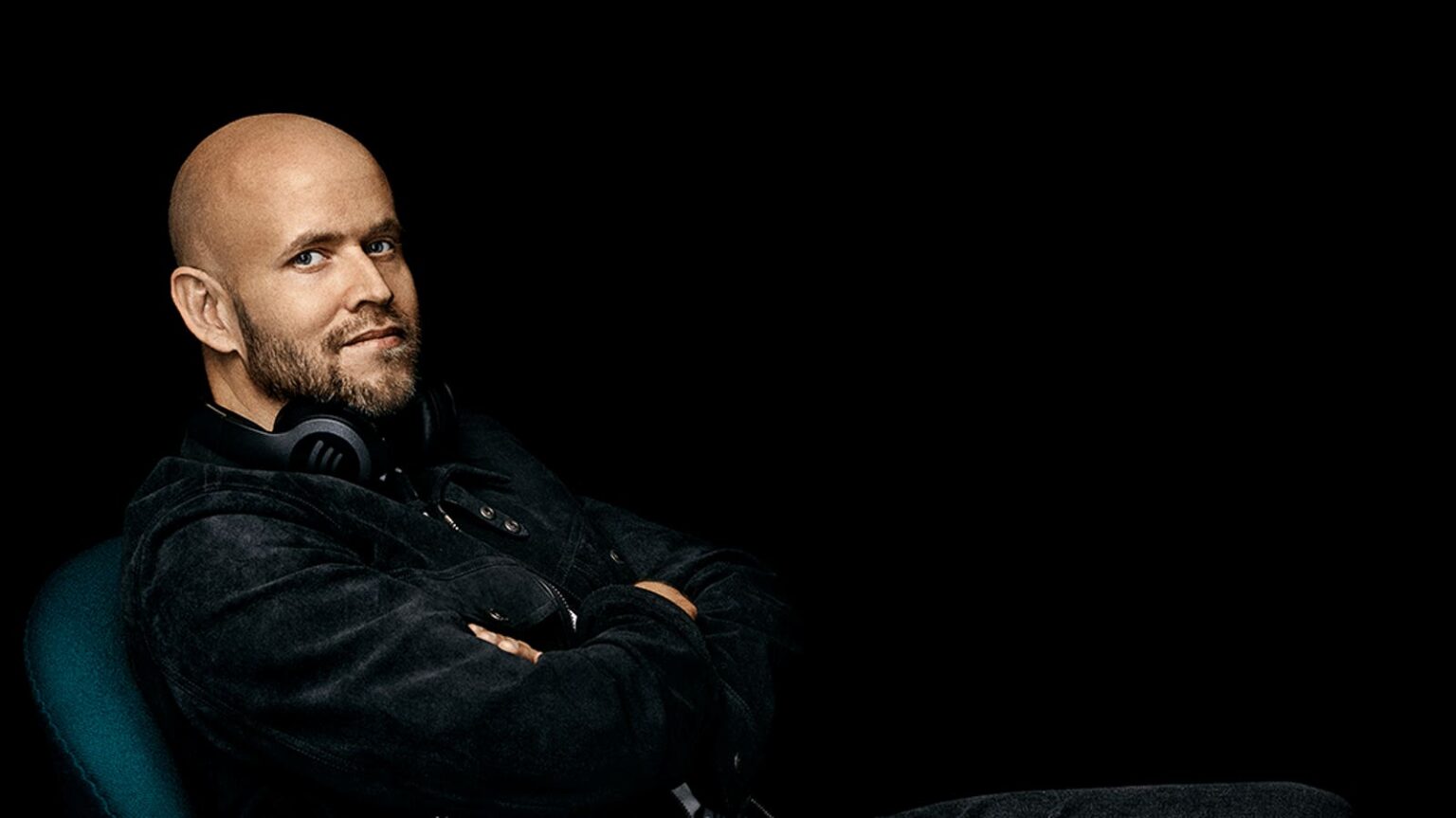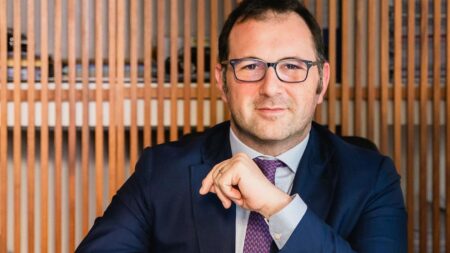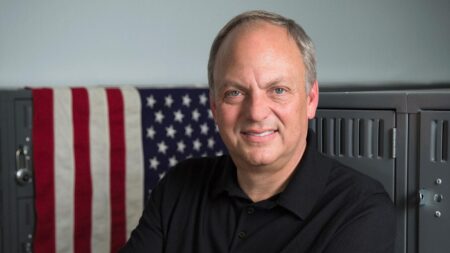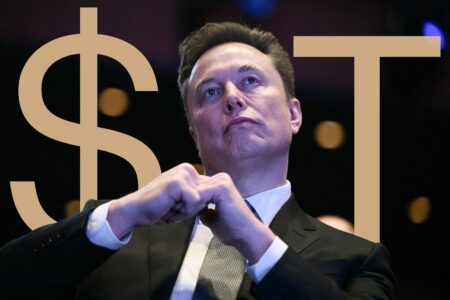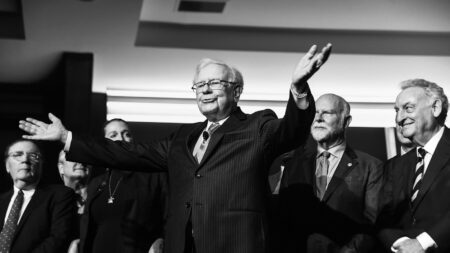Daniel Ek is stepping down as CEO of Spotify, the streaming company he cofounded in 2006, and moving to executive chairman. In his place, Spotify’s current presidents Alex Norström and Gustav Söderström will be elevated to co-CEOs. The transition will take place on January 1, 2026.
“I’ve spent twenty years, nearly my entire adult life, as Spotify’s CEO,” says Ek, 42. “I’m ready to go from a player to a coach.”
Spotify has been quietly working on the transition for years. In 2023, Ek promoted Norström and Söderström to the roles of co-presidents to expand their power and provide them with more leadership experience. “I feel now is the time, and I don’t want to hold them back,” says Ek. “They’re more than capable and more than ready to take it on. And in many ways, they are way better at leading this company than I ever was, as a combination.”
Incumbent CEOs Norström and Söderström each worked at several startups before joining Spotify more than a decade ago. Norström has historically handled business, marketing, and content. Söderström, a trained engineer, has focused 0n the technology and product side of the streamer. “We’re very comfortable and confident that this is going to work out quite well,” says Spotify board member Woody Marshall. “We’ve had some time watching them practice at full speed and they are ready for the game.”
Ek, meanwhile, will assume the new role of executive chairman and says he’ll work on long-term strategy and key investments. “Our challenge was: how do we get the benefit of their amazing execution but still remain founder-led?” says Ek. “I’m going to be involved in the long arc of the company, the big strategy decisions, the big capital allocation decisions. But to be brutally clear, so that there’s no doubt, they are going to run the company, they are the CEOs, they’ll make the decisions.”
Ek is leaving Spotify’s CEO role on a high note. Over the last year, Spotify shares have surged 100%, compared to the S&P 500’s 16% gain. Its market cap tops $150 billion, with the stock hovering around its all-time peak. As shares climb, so does Ek’s personal fortune. Forbes estimates that Ek—a college dropout from the rough Stockholm neighborhood of Ragved—now has a net worth of $10.3 billion.
Today, Spotify offers around 100 million songs to nearly 700 million active users—276 million of whom are paying subscribers. In 2024, Spotify’s revenue topped $18.36 billion.
Spotify’s growth has helped revive a flatlining music industry, which was once plagued by illegal piracy. In 2011, the same year Spotify debuted in U.S. markets, the music recording industry’s revenue was around $15 billion—40% less than the $24 billion in sales it logged ten years earlier. Fast forward to 2025, thanks to streamers like Spotify, annual recording sales are near $30 billion, with streaming accounting for $20 billion of the total. Spotify pays 70% of its revenue to musicians and rights holders. In 2024, it paid out $10 billion.
The soon-to-be CEOs, Norström and Söderström, aim to further grow Spotify’s user and revenue numbers, with a special focus on expanding into the emerging tech markets across Africa and Asia. “We have now hit 3% of the world’s population subscribing to Spotify,” says Alex Norström. “It’s not so unimaginable to think that we could have 10%, 15% of the world’s population subscribing to Spotify.”
Meanwhile, tech chief Gustav Söderström is betting AI will create significant change (and opportunity) in how people consume music. “It’s similar to the shift to smartphones. User interactions will change–and means there are new distribution opportunities, maybe even new form factors.”
The move to exit CEO role comes as Ek is increasingly looking beyond the music industry. In 2021, Ek, with Shakil Khan, an early Spotify investor and longtime confidant, launched a $1 billion investment holding company called Prima Materia to invest in high-risk, high-reward technology out of Europe. “It’s a company that builds companies,” says Ek. “We are trying to do things traditional VCs aren’t set up to do—industries where investors can’t go or where the timeline doesn’t make sense.”
One of the first long-term bets was Neko, a health screening start-up Ek launched via Prima Materia in 2018. The Neko team spent seven years creating hardware that could quickly test for skin cancer and heart disease before bringing the product to market. In January 2025, Neko raised a $260 million Series B round from venture capitalists including Lightspeed, General Catalyst, Lakestar, and Atomico. With a $1.8 billion post-money valuation, the deal made Neko Ek’s second unicorn start-up.
Ek is also investing in defense technology. Today, he serves as chairman of German startup Helsing, which began as a software company using artificial intelligence to analyze military and battlefield data. It has since evolved into a hardware company developing AI-powered military drones and submarines—think the European Anduril. In July 2025, Ek’s Prima Materia led a €600 million investment round in the startup. (The investment has caused a small minority of artists to threaten to pull their music from Spotify—few have.)
“When I invested in Helsing, it was something that the VC world couldn’t do or didn’t want to do. But for me, it was really important to help protect Europe,” says Ek. “Now, Helsing is deeply involved in defending Ukraine, which I think is incredibly important. Helsing was an investment that a normal venture, at the time, couldn’t do and didn’t want to do. And those are exactly the types of problems I want to try to focus on.”
Ek, the most important person in music, has always marched to his own drummer. As a teen, he dropped out of Sweden’s Royal Institute of Technology and worked at ad tech company Tradedoubler. There, he created analytics software, which the company later bought for $2 million. Flush with more money than he could have ever dreamed, Ek briefly lived the rock star life. He bought a three-bedroom apartment in downtown Stockholm, a red Ferrari Modena, and nights of bottle service at Stockholm’s hottest clubs. He was miserable. Soon, he sold the Ferrari and retreated to a remote cabin where he played guitar and meditated. He toyed with becoming a musician.
As he pondered his future, Ek became friends with Tradedoubler’s chairman, Martin Lorentzon. It turned out, like Ek, Lorentzon had wealth but was looking for a mission. After months of self-searching, the pair founded Spotify to fix the shattered music industry.
It was 2006. Music was a mess. Illegal piracy had gutted once-fat CD sales. On the legal digital side, Apple’s iTunes was training consumers to forgo albums for individual songs, taking a significant cut of the revenue for the convenience. The death of the CD nearly cut the recording industry in half.
Ek and Lorentzon built a music service offering customers a better experience than piracy, and musicians and record labels a sustainable source of revenue (an ad-supported free tier and subscription premium service). The pair tailored the streamer to ride the two hottest trends in tech—smartphones and social media. Soon, Spotify was everywhere.
In 2016, Ek took Spotify public via a rarely used direct listing—a process that involved no investment bankers, no new shares being offered, and where supply and demand set the IPO price. Shares have surged 350% since its debut.
Recently, Spotify has been expanding beyond music to become the hub for all things audio: podcasts, news, audiobooks, and education. Ek has spent hundreds of millions acquiring podcast talent and production tools, including Gimlet Media, Parcast, and Bill Simmons’ The Ringer. Along the way, he made mega deals with podcasters, including Joe Rogan and Alex Cooper. “Everyone underestimates audio. It should be a multi-hundred-billion-dollar industry,” Ek told Forbes in 2021. “Audio is ours to win.”
Soon, Ek will entrust his future co-CEOs, Norström and Söderström, to execute the winning strategy. Not that the young billionaire has plans to slow down.“I started Spotify not because I thought the music industry was a great business, but because I wanted to solve a problem,” says Ek. “Solving problems is my life’s hobby. And the good news or bad news—whichever way you want to put it—is there’s plenty of problems around the world to focus on.”
Read the full article here


